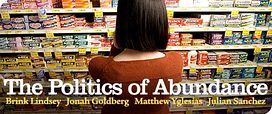In his post on “Escape from Freedom,” Julian offers some interesting observations and speculations about various ways in which freedom’s momentum could be throttled or reversed. Of course one must always keep such dark possibilities in mind — eternal vigilance and all that.
But I really think that, while I may be a cockeyed optimist, most people are more vulnerable to — and should be on their guard against — slipping into the opposite kind of error. In The Myth of the Rational Voter (see here for a helpful, busy-reader-friendly excerpt), Bryan Caplan tells us that public opinion, on economic issues at least, is afflicted with what he calls “pessimistic bias,” or “a tendency to overestimate the severity of economic problems and underestimate the (recent) past, present, and future performance of the economy.”
A similar kind of pessimistic bias is almost de rigueur for intellectuals contemplating the human condition and its prospects. Anything that hints of a belief in progress is vulnerable to being dismissed as simple-minded Whiggish naivete. Serious people are supposed to sound like Woody Allen:
“More than any time in history mankind faces a crossroads. One path leads to despair and utter hopelessness, the other to total extinction. Let us pray that we have the wisdom to choose correctly.”
Personal experience has stripped me of pessimistic bias. I was born in 1962, the year of the Cuban missile crisis. When my parents built the house I grew up in, they installed a fallout shelter in the backyard. I remember going to bed as a kid and hearing sirens, and wondering to myself if it was a civil defense warning and I should wake my parents. I fully expected to live my whole life under the shadow of endless global conflict with communism. And then, in my twenties, communism went poof.
I came to political awareness during the ’70s, when the economy and the country seemed to be falling apart. And then, just a few years later, inflation went poof and we embarked on a quarter-century-long boom that’s still going strong.
Taking the longer view, I look at graphs of one indicator of human well-being after another, and each one looks the same. Time after time, the line runs along the bottom of the page for 10,000 dismal, dreary years until, a couple centuries ago, it starts rocketing upward. Looking at these graphs, I just can’t shake the conviction that, as the subtitle of one of my favorite books puts it, there is a logic of human destiny. And that this logic is inextricably connected with the unfolding of human freedom.

